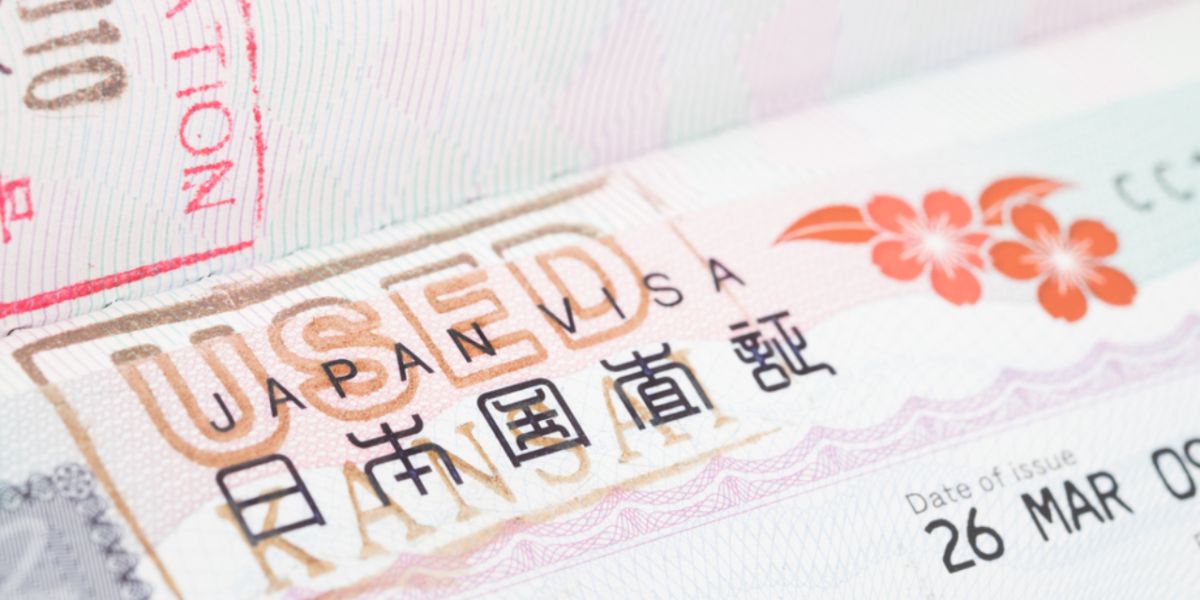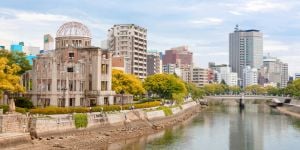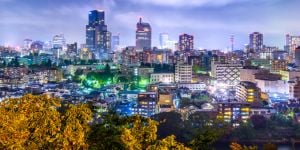
Japan has something to appeal to almost every type of traveler. Are you dying to explore Japanese history and culture, taste Japanese cuisine, or ride the lightning-fast Shinkansen trains? With the Working Holiday Visa (WHV) program in Japan, you can enjoy the adventure around every corner, taking your time and having a part-time job to help finance your trip.

Let's remember the natural hot springs, the superb Japanese cuisine (sushi lovers should be delighted!), the advanced technology, the manga and anime, the famous Studio Ghibli, the karaoke, the unique and genuinely original hotels, the fashion, etc. Beyond all that, Japan is, above all, a safe country where the crime rate is meager.
In this article, you will find the requirements to make your Working Holiday Visa application in Japan go as smoothly as possible and make your stay great!
How to be eligible for the Working Holiday Visa in Japan?
The working holiday programs are a fantastic opportunity for young people from Japan and partner countries/regions to explore new places while earning extra money. These programs, established through bilateral agreements, allow participants to enter each country primarily to enjoy their holidays but also give them the chance to work and save up for their travels.
The main goal of these programs is to provide young individuals with a broader perspective by immersing them in the culture and way of life of their partner countries/regions. It enriches their personal experiences, fosters mutual understanding, and strengthens the bond between Japan and its partner nations.
Different nationalities may have additional requirements when applying for a working holiday visa. To learn more about the WHV application process, you can contact the Embassies or Consulates-General of Japan in your country/region.
You can also seek assistance from the Interchange Association at the Taipei or Kaohsiung Offices. They can provide you with the necessary information and guidance.
Here are the conditions you must consider to be eligible for the WHV program in Japan:
Your nationality
Japan took the initiative and launched the first working holiday program with Australia in 1980. Since then, they have expanded these programs and partnered with 29 countries/regions as of August 1st, 2023:
Australia, United Kingdom, New Zealand, Canada, South Korea, France, Germany, Portugal, Ireland, Denmark, Taiwan, Hong Kong, Norway, Poland, Slovakia, Austria, Hungary, Spain, Argentina, Chile, Iceland, Czech Republic, Lithuania, Sweden, Estonia, the Netherlands, Uruguay, Finland, and Latvia
(Uruguay, Finland, and Latvia have been added to the list as from 2023).
However, it would help if you had more than this to live in one of these countries to be eligible for the WHV in Japan.
Suppose you are from Australia, New Zealand, Canada, the United Kingdom, the Republic of Korea, Ireland, Denmark, Norway, Portugal, Poland, Slovakia, Hungary, Spain, Argentina, Chile, Iceland, Czech Republic, Lithuania, Uruguay, Finland, or Latvia. In that case, you must currently reside in their respective countries.
If you are a resident of Hong Kong, a valid HKSAR or British National Overseas passport is required.
If you are a resident of Taiwan, you must possess a valid Taiwanese passport.
Your age
To apply for a working holiday program in Japan, you must be between 18 and 30 years old.
Suppose you are a citizen of Australia, Canada, the Republic of Korea, and Ireland. In that case, your eligible age should be between 18 and 25 unless the competent authorities of Japan agree to extend the age limit to 30.
In the case of Iceland, you must be between 18 and 26 years old.
Valid passport
Your passport needs to be valid for at least 12 months after you arrive in Japan and have empty pages. Indeed, the blank pages are necessary for your Japanese WHV visa to be affixed and for the stamps to be placed on it when you enter and leave the country.
Good to know:
Participants who have obtained their visas are highly advised to exercise utmost caution with their passports. Once lost, reissuing the passport and a new WHV visa for Japan could be tedious and challenging, and it could completely change your plans.
Having sufficient savings / minimum budget
Let's face it – Japan is a costly country to live in (see below in the paragraph on the cost of living in Japan), and you must go there full-handed.
To receive a permit to go to Japan on a WHV, you must have a budget (for food, accommodation, travel expenses, etc.), at least for the beginning of your stay in Japan. It is advised to have at least €3,100 in your bank account. You will need to prove that you have this amount with an official receipt from your bank.
Being in good health
To participate in the working holiday programs in Japan, you must be in good health. Also, it's strongly recommended that you have proper health coverage for all cases of illness, hospitalization, disability, repatriation, and even maternity.
If you're planning to stay in Japan for more than three months on a visa and not working full-time, obtaining National Health Insurance is necessary.
However, if your stay is shorter, securing overseas travel insurance before your arrival is strongly advised. It will ensure that you're well-prepared and won't have to deal with any additional stress in case of an unfortunate accident.
As we explained above, Japan is a country where life is costly. So imagine being there, and something wrong happens; you have to be treated in a hospital or even repatriated – without health insurance in Japan, the cost of treatment could be an arm and a leg!
Good to know:
It is compulsory to have a Japanese social security subscription managed by the municipality — this is something you will have to do once you have arrived in Japan. This social security does not cost much for those who come into the country as they do not yet have a job and, therefore, no income. Social protection only covers part of the care you may need. The rest will always be at your expense.
First-time participation
Only one participation is allowed per participant, regardless of their country of origin. You must have never been issued a WHV in Japan in the past.
Good to know:
Have you ever been on a WHV in another country? If so, this will be fine and will not affect your WHV application in Japan.
The quota per country
When a WHV agreement is signed between two countries, a quota is usually set so that the receiving country can control the number of visas granted annually and the number of participants who enter its territory each year. In the case of Japan and past WHV agreements, the number of participants allocated to Japan per country per year is as follows:
- Australia - no limit;
- New Zealand - no limit;
- Canada - 6,500;
- South Korea - 10,000;
- France - 1,800;
- Germany - no limit;
- the United Kingdom - 1,000;
- Ireland - 800;
- Denmark - no limit;
- Taiwan - 10,000;
- Hong Kong - 1,500;
- Norway - no limit;
- Portugal - no limit;
- Poland - 500;
- Slovakia - 400;
- Austria - 200;
- Hungary - 200;
- Spain - 500;
- Argentina - 400;
- Chile - 200;
- Iceland - 30;
- Czech Republic - 400;
- Lithuania - 100;
- Sweden - no limit;
- Estonia - 100;
- The Netherlands - 200;
- Uruguay - 100;
- Finland - 200;
- Latvia - 100.
Good to know:
If your country does not offer many places to go to Japan for a WHV and you want more chances to be accepted, you are advised to apply at the beginning of the year as the quotas are reset on January 1 every year.
Possessing a return air ticket
In the case of the WHV in Japan, you must prove to the Japanese government that you can buy a return ticket. You will have two options:
- Buy a return ticket (for a minimum of 6 months) with a changeable return date;
- Present proof that you have a minimum of €4,500 in your account instead of the €3,100 mentioned above in the "Having savings" section. The Embassy of Japan recommends this solution.
Having a clean criminal record in Japan
A clean criminal record is required to receive the green light to go on a WHV in Japan. It means that you must not have committed any crime for your application to be considered by the Japanese government. To access your criminal record, contact the Ministry of Justice or the Federal Police in your country.
Duration and cost of the visa in Japan
The WHV visa is valid for 12 months and will be activated when you enter Japan. You will also have 12 months to travel to Japan once you have received the visa.
The visa application is free of charge in most countries. Your WHV visa will also allow you to go out and come back to Japan as many times as you like, but you will still need to notify Japanese customs that you are coming back.
Good to know:
You cannot take your dependents if you apply for a WHV for Japan. For example, you cannot bring your children to Japan. If you want to go on a WHV to Japan with your partner or fellow students, you must apply separately, and each application will be processed independently. Each person will, of course, need to be eligible under the conditions mentioned in this article.
How to apply for a Japan WHV
When applying for a Japan WHV, you will need the following documents:
- A valid passport: A scan of the identity pages of your passport as well as two blank pages so that you have room to put the visa and new stamps;
- A color photo without filters or retouching, in passport size 3.5 x 4.5 cm, preferably with a white background;
- A letter of motivation (English use recommended);
- A plan of stay that explains how you plan to spend your WHV in Japan, with details of the areas you intend to visit (English use recommended);
- A CV or resume;
- Proof of sufficient funds to cover return airfares and expenses in Japan (for example, a credit card statement showing the credit limit or a bank statement for the last three months);
- Airline tickets;
- The medical insurance policy quotation, including the global indemnity, is valid for at least one year from the entry date;
- A clean criminal record;
- A medical certificate less than one month old.
To submit your application, visit your country's Japanese embassy or consulate.
Planning your move to Japan
The cost of living in Japan
Before traveling to Japan, we recommend you know the cost of living to prepare your budget.
Here is a table that will give you an idea of the cost of living in Japan - (source Numbeo; as of December 2023):
Currency: USD | |
RENT PER MONTH | |
1-bedroom flat (in the city center) | 566,84 |
1-bedroom flat (outside the city center) | 387.28 |
3-bedroom flat (city center) | 1179.09 |
3-bedroom flat (outside the city center) | 744.80 |
UTILITIES | |
Water, heating, electricity, air conditioning, waste collection for an 85m² flat | 173.54 |
Internet (ADSL/cable, 60 Mbps or more, unlimited data) | 34.09 |
TRANSPORTATION | |
1 ticket (one way) for local transport | 1,51 |
Monthly pass for local transport | 54.55 |
SHOPPING/GROCERIES | |
Rice (1 kg) | 3.59 |
Milk (1 L) | 1.42 |
12 eggs (normal size) | 2.25 |
Bread (500 g) | 1.52 |
Chicken fillets (1 kg) | 6.21 |
Red meat (1 kg) | 15.73 |
Oranges (1 kg) | 4.14 |
Bananas (1 kg) | 2.33 |
Apples (1 kg) | 4.61 |
Potatoes (1 kg) | 2.69 |
Onions (1 kg) | 2.26 |
Water (1.5 L) | 0.67 |
Wine (mid-range bottle) | 6.68 |
Local beer (0.5 L) | 2.01 |
Imported beer (0.33 L) | 2.73 |
Cigarettes (pack of 20) | 4.09 |
LEISURE | |
Movie theatre - 1 seat | 12.37 |
Sports club - monthly cost for 1 person | 56.33 |
Looking for accommodation in Japan
Many working holiday participants choose to stay in guesthouses or 'gaijin houses'. These accommodations offer private bedrooms with shared facilities such as toilets, showers, kitchens, laundries, and lounges. They are affordable and convenient, usually equipped with a bed, refrigerator, TV, and sometimes free internet access. However, they can be noisy and lack privacy. Despite these drawbacks, they are often the most practical choice for working holiday participants.
The number of shared houses and apartments in Japan has gradually increased in recent years, although they are still relatively uncommon. You can find advertisements of accommodation options in Japan that would be safe, more money-saving, or more interesting to experience in English information magazines and websites:
- Youth hostels, sharehouses (a private room in a building with a shared bathroom and kitchen);
- Ryokan (typical Japanese-style hostels);
- Capsule hotels (a mini capsule with a TV and a bed);
- Manga Kissa (for manga fans! This is a manga-style café where it is also possible to rent a small private cubicle with a bed and where the toilets and showers are shared).
In addition, while some people manage to arrange a homestay, this option is rare in Japan. Renting a private apartment or house can be surprisingly challenging for working holiday participants.
Looking for jobs in Japan
It is strictly forbidden for WHV participants in Japan to work in bars, lounges, nightclubs, gambling establishments (casinos, gambling clubs, etc.), and other places that offend public morality in Japan.
If a participant works in any of these areas, it will be considered a violation of the Immigration Control and Refugee Recognition Act, and they will be deported.
WHV participants often opt for "baito", part-time jobs that pay around 7 to 8 euros per hour. These are part-time jobs in Japan, such as working in restaurants, cafes, factories, or simply handing out leaflets.
Giving language lessons (English, French or Spanish, for example) pays more, approximately 20 euros per hour.
The current economic downturn is impacting both wages and job availability. The job market for working holiday participants has become increasingly challenging due to the poor economic conditions and the influx of job seekers in Japan.
However, if you are over 21 and have a university degree, you should eventually be able to find work in Japan, as long as you are not too picky. It is crucial to bring sufficient funds to sustain yourself until you secure a job and to cover any unexpected circumstances, such as being unable to work or losing your job.
In the past, finding a job as an English teacher was relatively easy. However, it has become more challenging with the growing number of people seeking employment in this field in Japan.
On average, it takes newcomers about one to two months to secure a teaching position. It can be emotionally, mentally, and financially challenging during this period, so it is vital to ensure you have enough money to support yourself while you search for work.
Learning the Japanese language in Japan
Things may be complicated during your stay if you don't speak Japanese. We recommend that you take Japanese lessons before you leave. Think of applications such as Babbel, Duolingo, Rosetta Stone, or Memrise.
First steps to take upon your arrival in Japan
WHV Japan participants must go to the municipal office closest to their residence and inform the Ministry of Justice of their place of residence within 14 days of arrival in the country. Please see the Japan Immigration Bureau website for more details.
You must also obtain your "Zairyu card" on arrival. It is the resident card for any foreigner who intends to stay in Japan for over 90 days and must have it for the entire stay.
Useful links:
We do our best to provide accurate and up to date information. However, if you have noticed any inaccuracies in this article, please let us know in the comments section below.








